Related Research Articles

David Bowie is the second studio album by English musician David Bowie. After the commercial failure of his 1967 self-titled debut album, Bowie acquired a new manager, Kenneth Pitt, who commissioned a promotional film in hopes of widening the artist's audience. For the film, Bowie wrote a new song, titled "Space Oddity", a tale about a fictional astronaut. The song earned Bowie a contract with Mercury Records, who agreed to finance production of a new album, with Pitt hiring Tony Visconti to produce. Due to his dislike of the song, Visconti appointed engineer Gus Dudgeon to produce a re-recording for release as a lead single, while he produced the rest of the album.
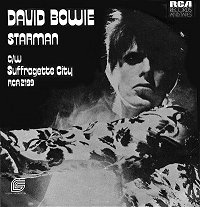
"Starman" is a song by English musician David Bowie. It was released on 28 April 1972 by RCA Records as the lead single of his fifth studio album The Rise and Fall of Ziggy Stardust and the Spiders from Mars. Co-produced by Ken Scott, Bowie recorded the song on 4 February 1972 at Trident Studios in London with his backing band known as the Spiders from Mars – comprising guitarist Mick Ronson, bassist Trevor Bolder and drummer Mick Woodmansey. The song was a late addition to the album, written as a direct response to RCA's request for a single; it replaced the Chuck Berry cover "Round and Round" on the album. The lyrics describe Ziggy Stardust bringing a message of hope to Earth's youth through the radio, salvation by an alien 'Starman'. The chorus is inspired by "Over the Rainbow", sung by Judy Garland, while other influences include T. Rex and the Supremes.
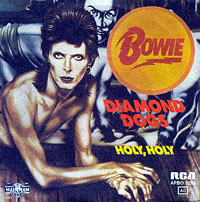
"Diamond Dogs" is a 1974 single by English singer-songwriter David Bowie, the title track of the album of the same name.
"The Man Who Sold the World" is a song by English singer-songwriter David Bowie. The title track of Bowie's third studio album, it was released in November 1970 in the US and in April 1971 in the UK by Mercury Records. Produced by Tony Visconti, it was recorded at Trident and Advision Studios in London in May 1970, towards the end of the album's sessions; Bowie recorded his vocal on the final day of mixing for the album, reflecting his generally dismissive attitude during the sessions. Musically, it is based around a "circular" guitar riff from Mick Ronson. Its lyrics are cryptic and evocative, being inspired by numerous poems including the 1899 "Antigonish" by William Hughes Mearns. Bowie's vocals are heavily "phased" throughout and have been described as "haunting".

"Rubber Band" is a song by English singer-songwriter David Bowie. It was recorded in October 1966 following Bowie's dismissal from Pye Records and helped secure him a record contract with Decca-subsidiary Deram Records, who released it as a single in the United Kingdom on 2 December of the same year. A departure from the mod-style sound of his previous releases, "Rubber Band" displays a style informed by vaudeville and British music hall – influenced particularly by British actor Anthony Newley. The lyrics tell the story of a man who goes off to war and, upon his return, finds his lover fell for a brass band conductor.
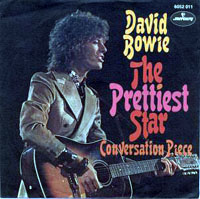
"The Prettiest Star" is a song by David Bowie, originally released as a single in March 1970.
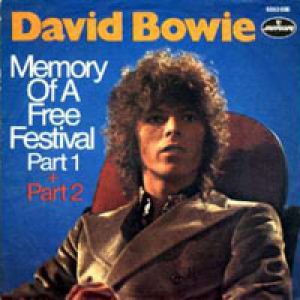
"Memory of a Free Festival" is a 1970 single by English singer-songwriter David Bowie. The song had originally been recorded in September 1969 as a seven-minute opus for Bowie's second self-titled album. It was reworked in March–April 1970 at the behest of Mercury Records, the label believing that the track had a better chance of success as a single than "The Prettiest Star", released earlier in the year. Bowie and Tony Visconti roughly split the track in half, re-recording it so both halves could function as individual songs. A more rock-oriented version than the earlier album cut, this rendition featured guitarist Mick Ronson.

"Holy Holy" is a song by English singer-songwriter David Bowie, originally released as a single in January 1971. It was recorded in November 1970, after the completion of The Man Who Sold the World, in the perceived absence of a clear single from that album. Like Bowie's two previous singles, it sold poorly and failed to chart.

"John, I'm Only Dancing" is a song by English musician David Bowie, originally released as a non-album single on 1 September 1972. A glam rock and R&B number, the lyrics describe a situation in which the narrator informs his lover not to worry about the girl he is with because he is "only dancing" with her. Although ambiguous, many interpreted it as concerning a gay relationship. Recorded in London in June 1972, it was boasted by a low-budget promotional video directed by Mick Rock. It reached number 12 in the UK; RCA refused to release it in America due to its suggestive lyrical content.

"Drive-In Saturday" is a song by English musician David Bowie from his 1973 album Aladdin Sane. It was released as a single a week before the album and, like its predecessor "The Jean Genie", became a Top 3 UK hit.
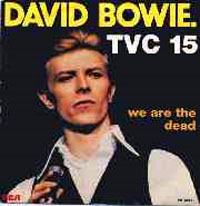
"TVC 15" is a song by English musician David Bowie, released on his 1976 album Station to Station. RCA Records later released it as the second single from the album on 30 April 1976. The song was recorded in late 1975 at Cherokee Studios in Los Angeles. Co-produced by Bowie and Harry Maslin, the recording featured guitarists Carlos Alomar and Earl Slick, bassist George Murray, drummer Dennis Davis, pianist Roy Bittan and Warren Peace on backing vocals. The upbeat song is mostly art rock performed in a style reminiscent of the 1950s. Lyrically, the song concerns a character's girlfriend being eaten by a television set. It was inspired by a dream of Iggy Pop's and Bowie's role in The Man Who Fell to Earth (1976). Some lyrics are also influenced by the Yardbirds and Kraftwerk.
"All the Madmen" is a song written by David Bowie in 1970 for his album The Man Who Sold the World, released later that year in the US and in April 1971 in the UK. One of the many tracks on the album about insanity, it has been described as depicting "a world so bereft of reason that the last sane men are the ones in the asylums".
"Black Country Rock" is a song by English musician David Bowie, released on his 1970 album The Man Who Sold the World. The song was recorded in May 1970, with sessions taking place at Trident and Advision Studios in London. The lineup featured Bowie on lead vocals, guitarist Mick Ronson, bassist/producer Tony Visconti, drummer Mick Woodmansey and Ralph Mace on Moog synthesiser. The track was mostly composed by Ronson and Visconti, who developed it using a basic song sketch from Bowie. Labelled under the working title "Black Country Rock", Bowie used the title to write the lyrics towards the end of the sessions, resulting in a repeated two-line verse and chorus. A blues rock and hard rock number, Bowie imitates T. Rex's Marc Bolan in his vocal performance.
"Oh! You Pretty Things" is a song written by English singer-songwriter David Bowie, released on his 1971 album Hunky Dory. It was the first song he wrote for the album. Bowie recorded the song as a demo before giving it to singer Peter Noone, lead singer of Herman's Hermits, who decided to release it as his debut solo single. Featuring Bowie on piano, Noone's recording was produced by Mickie Most and featured structural and lyrical differences from Bowie's later version. Released by RAK Records in April 1971 under the title "Oh! You Pretty Thing", the single peaked at number 12 in the UK, becoming Bowie's biggest success as a songwriter since his own single "Space Oddity" two years earlier.

"Velvet Goldmine" is a song by English singer-songwriter David Bowie. A glam rock number with lyrical references to oral sex, it was originally recorded on 11 November 1971 at Trident Studios in London during the sessions for his 1972 album The Rise and Fall of Ziggy Stardust and the Spiders from Mars. It was ultimately left off the album and subsequently released as a B-side of the UK re-release of "Space Oddity" in 1975. Praised by biographers as an undervalued classic, it later appeared on compilation albums, including on Re:Call 1, part of the Five Years (1969–1973) boxed set, in 2015. Its namesake was used for Todd Haynes's 1998 film of the same name.
"Watch That Man" is a song written by David Bowie, the opening track on the album Aladdin Sane from 1973. Its style is often compared to the Rolling Stones' Exile on Main Street. The mix, in which Bowie's lead vocal is buried within the instrumental sections, has generated discussion among critics and fans.
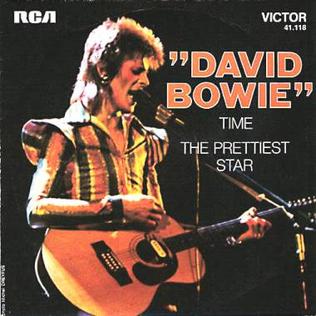
"Time" is a song by English singer-songwriter David Bowie. Written in New Orleans in November 1972 during the American leg of the Ziggy Stardust Tour, it was recorded in London in January 1973 and released as the opening track on side two of the album Aladdin Sane that April. An edited version of the song supplanted the release of the single "Drive-In Saturday" in the United States, Canada and Japan. It was also released in France and South Africa, while early Spanish copies of David Live included a free copy of the single.
"Lady Grinning Soul" is a ballad written by English musician David Bowie, released on the album Aladdin Sane in 1973. It was a last-minute addition, replacing the "sax version" of "John, I'm Only Dancing" as the closing track. The composer's first meeting with American soul singer Claudia Lennear in 1972 is often cited as the inspiration for the song. In 2016, after Bowie's death, an interview with Lennear revealed that Bowie called her in 2014, and told her the song had been written about her.
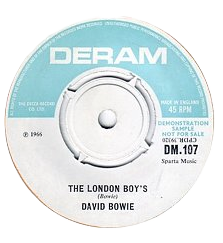
"The London Boys" is a song by English musician David Bowie. It was first released as the B-side of the single "Rubber Band" in the United Kingdom on 2 December 1966. It was originally written and demoed in 1965 with the Lower Third for potential release as the artist's debut single for Pye Records but it was rejected. After a year of rewrites, he recorded a new version with a new band, the Buzz, which helped secure him a record contract with Decca-subsidiary Deram Records. Unlike the A-side, "The London Boys" retains the Mod feel of Bowie's previous singles. The dark lyrics concern a 17-year-old girl who left home for London. As she wants to get to know the London boys, she turns to take pills to fit in. Like his previous singles, it failed to chart. Decca later issued it as an A-side in 1975.
"Let Me Sleep Beside You" is a song written and recorded by English singer-songwriter David Bowie. It was recorded on 1 September 1967 at Advision Studios in London and marked the beginning of Bowie's working relationship with producer Tony Visconti, which would last for the rest of Bowie's career. A departure from the pop and music hall-influenced material of Bowie's 1967 self-titled debut album and other singles for Deram Records, the song displays a more rock-oriented sound with a cello arrangement from Visconti. The impressionist lyrics also depart from Bowie's prior works, describing love using the act of sleeping together rather than through emotional attachment. The song was rejected by Deram for release as a single, purportedly due to the risqué title. It remained unreleased until 1970's The World of David Bowie compilation.
References
- ↑ Cann 2010, p. 154.
- ↑ David Buckley (1999). Strange Fascination – David Bowie: The Definitive Story: p.79
- ↑ Chris Welch (1999). We Could be Heroes
- ↑ Carr & Murray 1981, p. 27.
- ↑ O'Leary 2015, chap. 3.
Sources
- Cann, Kevin (2010). Any Day Now – David Bowie: The London Years: 1947–1974. Croydon, Surrey: Adelita. ISBN 978-0-95520-177-6.
- Carr, Roy; Murray, Charles Shaar (1981). Bowie: An Illustrated Record. London: Eel Pie Publishing. ISBN 978-0-38077-966-6.
- O'Leary, Chris (2015). Rebel Rebel: All the Songs of David Bowie from '64 to '76. Winchester: Zero Books. ISBN 978-1-78099-244-0.